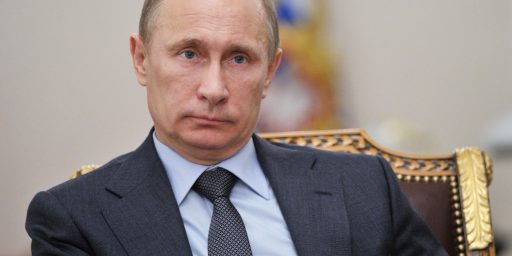Russia, Technology, and Defense
Glenn Reynolds links to a post at Responsible Nanotechnology on Russia’s plans to invest heavily in nanotechnology research over the next few years. Here’s the conclusion of that post:
In summary, it looks like: A) Russia will spend huge amounts of money over the next several years in an effort to become a world player in nanotech development; B) at least in the early stages, that spending will focus mostly on early-generation nanoscale technologies, and not on molecular manufacturing; and C) this announcement, and the language used in making it, would suggest that an arms race built around nano-enabled weapons is more likely now than it was before
It might be worthwhile to place this in a little more context. Much technology in the United States, including the technology that this post exploits in the form of the Internet, solid-state electronics, and integrated circuitry was developed with heavy subsidies from the Department of Defense. But we’ve also developed lots of other technology that didn’t receive subsidies from the military or, indeed, from government in any form.
The Soviet Union is less than 20 years gone. During the Communist Party’s seventy year rule of Russia the country, of course, was a command economy and, since there was precious little entrepeneurship or private enterprise during that period, nearly all of the technology (and the Soviet Union was a technological leader in many areas) was developed with government subsidies and those subsidies were heavily weighted towards technologies with military applications.
Since the collapse of the Soviet system, although much has changed the system of financing technological research hasn’t:
“In my 15 years of observations since the collapse of the USSR and my involvement in defense convergence projects, I find that one crucial problem persists” in Russia, Barbanel [ed. Jack Barbanel, executive managing director of the Moscow-based Strategic Investment Group] told an audience of roughly 100 at last week’s Semi Expo/CIS2006 conference here. “Despite the government’s active role in support of both domestic and foreign investments in high technology, the concept of separate defense and commercial sectors is foreign from a financial-model point of view.”
That should brighten your day.






WHY should that brighten my day? The public evidence is that Putin is hell bent on restoring a very strong centralized government in Moscow. His key supporters are all old KGB types. Why exactly is the fact that they are continuing the old dual-use industrial model (with the military apps the heavyweight side) a good thing.
Or did you leave off the [sarcasm] tag?
Dave,
Linked in from Instapundit. First an observation:
In a prior life I worked on software emulation of RadialKeretomety for B&L back before lasers took over. I took several trips over to Russia to review their methods in period prior to the wall falling. In the process I got interested in the techniques they used to build the RK diamond knives the doctors used in the process.
I struck up a relationship with the machinist that was making these instruments. He was well into his 60’s at the time. Had been doing machining since he was 14. He could turn out the most exquisite tooling you could imagine. Polished, smooth operating, to measurements of .001″. All on a lathe he had heavily modified that was originally built in 1896 in the UK!
We made the same instrument but on what was then a $1m CNC station. The only difference was we made 2000 a week for the machinist’s 10.
Moral: Watching that man work humbled my then young persona of the supremecy of Western computerized industrilization. It is not necessarily the $$ you put into an effort but the ingenuity that you are able to deliver to the task.
With nanotech, a person or small group of sufficient acumen that can deliver the first small cell of self assemblers will take an enormous lead. And the russians have proved to my satisfaction their ability to think outside the box. Just consider, they stayed ahead of the US in the space race for a while by pulling off tricks nobody in the West thought of using less technology than we did.
Consider it.